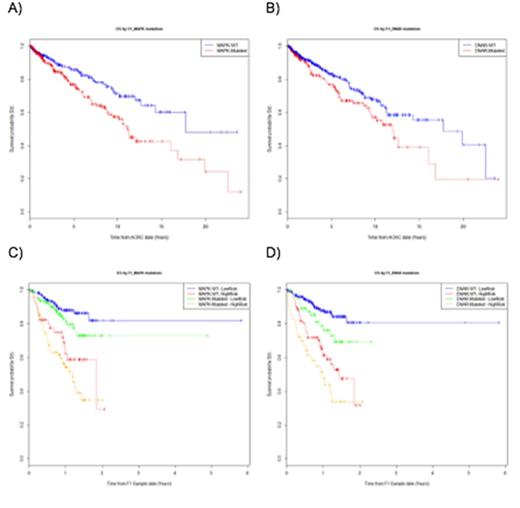Abstract
Introduction:
Molecular assessment using conventional karyotyping, interphase FISH and gene expression profiling (GEP) has revealed multiple subgroups of myeloma with distinct pathogenesis and clinical course. While these technologies have tremendously impacted risk assessment they have had little contribution to the identification of therapeutic targets. Next generation sequencing (NGS) technology can identify mutations in genes of key cancer pathways, which impact outcome and are targetable by new drugs. Targeted gene panels can analyze clinical samples in sufficient depth affording the opportunity to incorporate NGS into clinical decision making in a meaningful way. Using the FoundationOne Heme test (F1H), we aimed to determine the mutational spectra of cancer-associated genes in multiple myeloma (MM), their association with disease risk and their effect on clinical outcome.
Methods:
DNA and RNA were extracted from CD138-selected MM cells. Comprehensive genomic profiling (CGP) using F1H was performed by Foundation Medicine, Inc (Cambridge, MA). Sequencing to an average depth of 470x (range: 5-3781) was performed on a HiSeq2500 sequencer. Sequences were analyzed for base substitutions, insertions, deletions, copy number alterations, and rearrangements in frequently altered genes. Annotated germline variants (dbSNP135) were removed. Somatic alterations in COSMIC (v62) and inactivating variants in tumor suppressor genes were called as biologically significant. GEP of CD138-selected MM cells using Affymetrix U133 2.0 plus arrays was performed as described. Overall survival analysis was done using log-rank tests.
Results:
CGP was performed on a total of 630 patients (3.4% MGUS, 6.5% SMM, 24.9% newly diagnosed MM, 24.9% relapsed MM, 18.8% MM in remission). We found increasing mutation load in from MGUS to relapsed MM. Later stages of the disease had an increased frequency of mutations in genes coding for epigenetic modulators and proteins involved in DNA repair. Alterations of TP53 and RB1 among others weresignificantly more frequent in GEP-defined high-risk (HR) disease and after relapse. Patients of the GEP-defined MF molecular subgroup carried a significantly greater mutation load. While there was no difference in the frequency of altered RAS/MAPK pathway genes between newly diagnosed and relapsed patients, we found an increased average mutant allele frequency in relapsed patients, indicating clonal selection. Using paired GEP data we identified gene expression signatures for patients with RAS/MAPK activation and patients with loss-of-function mutations in the DNA repair pathway, suggesting a functional relevance of these mutations. Mutations in either of these pathways were associated with significantly worse overall survival (OS) (Figure 1). Presence of DNA repair gene mutations resulted in significantly worse OS within the GEP-defined low-risk subgroup.
Among the 630 patients who underwent CGP, 396 had clinically relevant alterations, which were associated with either an FDA approved drug or a clinical trial. For example, 316 patients had alterations of the RAS/MAPK pathway. Recently we have shown clinical benefit of MEK directed therapy in this patient population. 39 patients had alterations in the mTOR pathway, suggesting benefit from mTOR inhibitors. 426 patients with MM had mutations in epigenetic modulators. For 37 of them therapy with demethylating agents was recommended. Many more epigenetic targeted drugs, such as EZH2 or Bromodomain inhibitors are currently in development.
Conclusion:
Using the F1H test we demonstrate a negative impact of somatic mutations of the MAPK and DNA repair pathways on outcome. In tandem, for 396 patients we identified genomic alterations, which suggest benefit from targeted treatment. Thus targeted therapy, guided by comprehensive genomic profiling, may be applied to the majority of MM patients, with the potential of significantly improving clinical outcomes. Comprehensive genomic profiling should therefore be considered in the routine work-up, especially for HR patients where outcomes remain poor.
Inferior outcome of patients with mutations in the MAPK or DNA repair pathway. Panels A) and C) mutation of MAPK pathway; Panels B) and D) mutation of the DNA repair pathway. Overall survival is measured from time of disease diagnosis in panels A) and B) and is shown from sample date in panels C) and D)
Inferior outcome of patients with mutations in the MAPK or DNA repair pathway. Panels A) and C) mutation of MAPK pathway; Panels B) and D) mutation of the DNA repair pathway. Overall survival is measured from time of disease diagnosis in panels A) and B) and is shown from sample date in panels C) and D)
Heuck:Millenium: Other: Advisory Board; Janssen: Other: Advisory Board; Celgene: Consultancy; University of Arkansas for Medical Sciences: Employment; Foundation Medicine: Honoraria. Chavan:University of Arkansas for Medical Sciences: Employment. Stein:University of Arkansas for Medical Sciences: Employment. Tytarenko:University of Arkansas for Medical Sciences: Employment. Weinhold:University of Arkansas for Medical Sciences: Employment; Janssen Cilag: Other: Advisory Board. Ali:Foundation Medicine, Inc.: Employment, Equity Ownership. Miller:Foundation Medicine, Inc.: Employment, Equity Ownership. Thanendrarajan:University of Arkansas for Medical Sciences: Employment. Schinke:University of Arkansas for Medical Sciences: Employment. Mohan:University of Arkansas for Medical Sciences: Employment. Sawyer:University of Arkansas for Medical Sciences: Employment. Peterson:University of Arkansas for Medical Sciences: Employment. Bauer:University of Arkansas for Medical Sciences: Employment. Ashby:University of Arkansas for Medical Sciences: Employment. Johann:University of Arkansas for Medical Sciences: Employment. van Rhee:University of Arkansa for Medical Sciences: Employment. Waheed:University of Arkansas for Medical Sciences: Employment. Davies:Millenium: Consultancy; Onyx: Consultancy; Janssen: Consultancy; Celgene: Consultancy; University of Arkansas for Medical Sciences: Employment. Barlogie:University of Arkansas for Medical Sciences: Employment. Morgan:CancerNet: Honoraria; Weismann Institute: Honoraria; MMRF: Honoraria; Takeda: Honoraria, Membership on an entity's Board of Directors or advisory committees; University of Arkansas for Medical Sciences: Employment; Bristol Myers Squibb: Honoraria, Membership on an entity's Board of Directors or advisory committees; Celgene: Honoraria, Membership on an entity's Board of Directors or advisory committees.
Author notes
Asterisk with author names denotes non-ASH members.


This feature is available to Subscribers Only
Sign In or Create an Account Close Modal